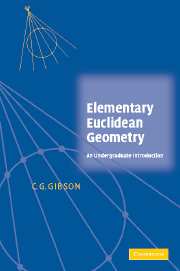Book contents
- Frontmatter
- Contents
- List of Figures
- List of Tables
- Preface
- Acknowledgements
- 1 Points and Lines
- 2 The Euclidean Plane
- 3 Circles
- 4 General Conics
- 5 Centres of General Conics
- 6 Degenerate Conics
- 7 Axes and Asymptotes
- 8 Focus and Directrix
- 9 Tangents and Normals
- 10 The Parabola
- 11 The Ellipse
- 12 The Hyperbola
- 13 Pole and Polar
- 14 Congruences
- 15 Classifying Conics
- 16 Distinguishing Conics
- 17 Uniqueness and Invariance
- Index
17 - Uniqueness and Invariance
Published online by Cambridge University Press: 06 July 2010
- Frontmatter
- Contents
- List of Figures
- List of Tables
- Preface
- Acknowledgements
- 1 Points and Lines
- 2 The Euclidean Plane
- 3 Circles
- 4 General Conics
- 5 Centres of General Conics
- 6 Degenerate Conics
- 7 Axes and Asymptotes
- 8 Focus and Directrix
- 9 Tangents and Normals
- 10 The Parabola
- 11 The Ellipse
- 12 The Hyperbola
- 13 Pole and Polar
- 14 Congruences
- 15 Classifying Conics
- 16 Distinguishing Conics
- 17 Uniqueness and Invariance
- Index
Summary
In this final chapter we give proofs of two central results. The first is the Uniqueness Theorem of Chapter 4, that two conics having the same infinite zero set are equal. And the second is the Invariance Theorem of Chapter 16.
Proof of Uniqueness
The Uniqueness Theorem for conics mimics the model provided by lines, namely that two lines L, L′ having the same zero set coincide. However, the corresponding statement for conics Q, Q′ is false, as was exemplified by point and virtual circles. The underlying problem with such examples is that the zero sets fail to be infinite. When we restrict ourselves to conics with infinite zero sets the analogous result does hold.
Theorem 17.1Let Q, Q′ be conics having the same zero set. Then Q, Q′ coincide, provided the common zero set is infinite. (The Uniqueness Theorem.)
Here is the proof for reducible conics. It uses no more than the Component Lemma, and the uniqueness result for lines.
Proof Since Q is reducible we can write Q = LM with L, M lines. Every point on L lies on Q, hence on Q′. Then the Component Lemma tells us that L is a line component of Q′, so Q′ = LM′ for some line M′. Suppose first that L, M intersect in a single point, or are parallel. Choose two points on M, not on L: then those points must lie on M′.
Information
- Type
- Chapter
- Information
- Elementary Euclidean GeometryAn Introduction, pp. 167 - 170Publisher: Cambridge University PressPrint publication year: 2004
